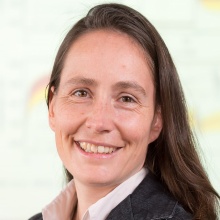Contact
+49 711 685 66684
+49 711 685 66684
Email
Pfaffenwaldring 9
70569 Stuttgart
Germany
Room: 2.243
Office Hours
Tuesdays, 1 to 2 pm in my webex room
Since I am member of many commissions and committees, which might interfere with this time slot, please apply for any requests beforehand. Thank you.
Subject
Systems Theory in Systems Biology
My research focuses on the modeling and analysis of intracellular regulation processes. The ultimate goal is the development and application of mathematical methods to facilitate a better systemic understanding of these processes for particular subsystems and the organization of molecular regulation mechanisms in general. My group works in close collaboration with partners from molecular and cellular biology. I focus in particular on the following topics:
- Dynamic modeling of intracellular regulation processes and their relation to phenotypes
- Statistical sampling-based approaches for parameter estimation and predictions
- Analysis methods for intracellular regulation networks based on their network topology
I am a member of the Excellence Cluster 'Data-integrated Simulation Science (EXC 2075)', the Research Unit 'Quantifying Liver Perfusion - Function relationship in Complex Researction - A Systems Medicine Approach (QuaLiPerF)' and the 'Stuttgart Research Center Systems Biology (SRCSB)'.

Peer-reviewed articles in scientific journals
Wagner V, Strässer R, Allgöwer F, Radde N (2023). A provably convergent control closure scheme for the method of moments arising from the Chemical Master Equation, Journal of Chemical Theory and Computation 19(24), 9049–9059, DOI: 10.1021/acs.jctc.3c00548
Adam S, Klingel V, Radde N, Bashtrykov P, Jeltsch A (2023). On the accuracy of the epigenetic copy machine - comprehensive specificity analysis of the DNMT1 DNA methyltransferase, Nucleic Acids Res 51(13):6622-6633. doi: 10.1093/nar/gkad465.
Wagner V, Radde N (2023). The impossible challenge of estimating non-existent moments of the Chemical Master Equation, Bioinformatics 39, Issue Supplement 1, i440–i447, https://doi.org/10.1093/bioinformatics/btad205.
Höpfl S, Pleiss J, Radde NE (2023). Bayesian estimation reveals that reproducible models in Systems Biology get more citations, Sci Rep 13, 2695 (2023). https://doi.org/10.1038/s41598-023-29340-2
Albadry M, Ehteshamzad N, Höpfl S, Böttcher M, Neumann J, Lupp A, Dirsch O, Radde N, Christ B, Christ M, Schwen LO, Laue H, Klopfleisch R, Dahmen U (2022). Cytochrome p450 enzymes in periportal steatosis: Modulation of drug metabolizing activity but not of pericentral expression pattern, Sci Rep, 12:21825, https://doi.org/10.1038/s41598-022-26483-6.
Graf D, Laistner L, Klingel V, Radde NE, Weirich S, Jeltsch A (2022). Reversible switching and stability of the epigenetic memory system in bacteria, FEBS J 2022 Nov 23. doi: 10.1111/febs.16690. Epub ahead of print. PMID: 36416580.
Thomaseth C, Radde NE (2022). The effect of normalization and error model choice on distributions of maximum likelihood estimators for biochemical reaction networks, IET Syst Biol 1– 13 (2022). https://doi.org/10.1049/syb2.12055
Wagner V, Castellaz B, Oesting M, Radde NE (2022). Quasi-Entropy Closure: A Fast and Reliable Approach to Close the Moment Equations of the Chemical Master Equation, Bioinformatics 38(18), 4352-4359, https://doi.org/10.1093/bioinformatics/btac501.
Klingel V, Graf D, Weirich S, Jeltsch A, Radde NE (2022). Model-based design of a synthetic oscillator based on an epigenetic methylation memory system, ACS Synthetic Biology, 2022, 11, 7, 2445-2455.
Jensch A, Lopes M, Vinga S, Radde N (2022). ROSIE: RObust Sparse Ensemble for outlIEr detection and gene selection in cancer omics data, Statistical Methods in Medical Research 31(5), 947 - 58.
Adam S, Bräcker J, Klingel V, Osteresch B, Radde NE, Brockmeyer J, Bashtrykov P, Jeltsch A (2022). Flanking sequences influence the activity of TET1 and TET2 and determine genomic 5hmC patterns, Commun Biol 5(1), 92.
Christ et al. (2021). Hepatectomy-induced alterations in hepatic perfusion and function - Towards multi-scale modeling for a better risk assessment in liver surgery, Frontiers in Physiology, section Computational Physiology and Medicine, Frontiers in Physiology, section Computational Physiology and Medicine 12, 2058.
Wagner V, Radde NE (2021). SiCaSMA: An Alternative Stochastic Description via Concatenation of Markov Processes for a Class of Catalytic Systems. Mathematics 2021, 9, 1074. https://doi.org/10.3390/math9101074
Klingel V, Kirch J, Weirich S, Jeltsch A, Radde NE (2021). Model-based robustness and bistability analysis for methylation-based, epigenetic memory systems, FEBS J 288: 5692-5707, doi: 10.1111/febs.15838.
Adam S, Hiwot A, Hornisch M, Wagner V, Lu J, Radde NE, Bashtrykov P, Song J, Jeltsch A (2020). DNMT1 activity, base flipping mechanism and genome-wide DNA methylation are regulated by the DNA sequence context, Nat Commun 11:3723, doi.org/10.1038/s41467-020-17531 (https://www.nature.com/articles/s41467-020-17531-8).
Eisenkolb I, Jensch A, Eisenkolb K, Kramer A, Buchholz PFC, Pleiss J, Spiess A, Radde NE (2019). Modeling of biocatalytic reactions: A workflow for model calibration, selection and validation using Bayesian statistics, AiChE J 2019;e16866.
Geissen E, Hasenauer J, Radde N (2019). Inference of finite mixture models and the effect of binning, Stat Appl Genet Mol Biol 18(4), 1-20.
Thomaseth C, Fey D, Santra T, Rukhlenko O, Radde NE*, Kholodenko B* (2018). Impact of measurement noise, experimental design, and estimation methods on Modular Response Analysis based network reconstruction, Sci Rep, 8, 16217. (*joint last authors)
Paul D, Radde N (2018). The role of stochastic sequestration dynamics for intrinsic noise filtering in signaling network motifs, J Theor Biol, 455, 86-96.
Jensch A, Frey Y, Bitschar K, Weber P, Schmid S, Hausser A, Olayioye M*, Radde N* (2018). Control of PKD activity and Golgi secretory function by the tumor suppressor DLC1, J Biol Chem, 293, 14407-14416, doi: 10.1074/jbc.RA118.003787. (*joint last authors)
Rehm M, Apweiler R, Beissbarth T, Berthold M, Bluethgen N, Burmeister Y, Dammann O, Deutsch A, Feuerhake F, Franke A, Hasenauer J, Hoffmann S, Höfer T, Jansen P, Kaderali L, Klingmüller U, Koch I, Kohlbacher O, Küpfer L, Lammert F, Maier D, Pfeifer N, Radde N, Röder I, Saez-Rodriguez J, Sax U, Schmeck B, Schuppert A, Seilheimer B, Theis F, Vera-González J, Wolkenhauer O (2018). Whither Systems Medicine? Exp & Mol Med, 50, e453.
Jensch A, Thomaseth C, Radde N (2017). Sampling-based Bayesian approaches reveal the importance of quasi-bistable behavior in cellular decision processes on the example of the MAPK signaling pathway, BMC Syst Biol (2017), 11:11, doi:10.1186/s12918-017-0392-6.
Thomaseth C, Kuritz K, Allgöwer F, Radde N (2016). The circuit-breaking algorithm for monotone systems, Math Biosci, 284, 80-91, doi:10.1016/j.mbs.2016.09.002.
Radde N, Hütt M-T (2016). The Physics behind Systems Biology, Eur Phys J Nonlin Biomed Phys, 4(7), 1-19, doi: 10.1140/epjnbp/s40366-016-0034-8.
Kirch J, Thomaseth C, Jensch A, Radde N (2016). The effect of model rescaling and normalization on sensitivity analysis on an example of a MAPK pathway model, Eur Phys J Nonlin Biomed Phys 4(3), 1-23.
Geissen EM, Hasenauer J, Heinrich S, Hauf S, Radde N (2016). MEMO - Multi-experiment mixture model analysis for censored data, Bioinformatics 32(16), 2464-72, doi:10.1093/bioinformatics/bwt190.
Weber P, Hornjik M, Olayioye MA, Hausser, A, Radde N (2015). A computational model of PKD and CERT interactions at the trans-Golgi network of mammalian cells, BMC Syst Biol, 9:9, doi:10.1186/s12918-015-0147-1.
Kramer A, Stathopoulus V, Girolami M, Radde N (2014). MCMC_CLIB: An advanced MCMC sampling package for ode models with highly correlated parameters, Bioinformatics 30(20):2991-2, doi: 10.1093/bioinformatics/btu429.
Kramer A, Calderhead B, Radde N (2014). Hamiltonian Monte Carlo Methods for Efficient Parameter Estimation in Steady State Dynamical Systems, BMC Bioinf 2014, 15(1):253, doi:10.1186/1471-2105-15-253.
Heinrich S, Geissen E-M, Kamenz J, Trautmann S, Widmer C, Drewe P, Knop M, Radde N, Hasenauer J, Hauf S (2013). Determinants for robustness in spindle assembly checkpoint signalling, Nat Cell Biol 15(11), 1328-39, doi:10.1038/ncb2864.
Thomaseth C, Weber P, Hamm T, Kashima K, Radde N (2013). Modeling sphingomyelin synthase 1 driven conversion of ceramide to sphingomyelin at the Golgi apparatus can be explained by a positive feedback mechanism, J Theor Biol 337, 174-180, DOI: 10.1016/j.jtbi.2013.08.022.
Offtermatt J, Radde N (2013). Convergence of posteriors for structurally non-identifiable problems using results from the theory of inverse problems. J Inverse Ill-Pose P 22(2), 251-276, ISSN (Online) 1569 – 3945, ISSN (Print) 0928-0219, doi:10.1515/jip-2012-0057.
Vehlow C, Hasenauer J, Kramer A, Raue A, Hug S, Timmer J, Radde N, Theis FJ, Weiskopf D (2013). iVUN: Interactive Visualization of Uncertain biochemical reaction Networks. BMC Bioinf 2013, 14(Suppl) 19: S2, doi:10.1186/1471-2105-14-S19-S2.
Weber P, Dingler C, Kramer A, Radde N (2012). Trajectory-oriented Bayesian experiment design versus Fisher A-optimal design: An in depth comparison study. Bioinformatics 28:i535-i541, doi: 10.1093/bioinformatics/bts377.
Radde N (2012). Analyzing fixed points of intracellular regulation networks with complex feedback topology. BMC Syst Biol 6:57, doi:10.1186/1752-0509-6-57.
Hasenauer J, Waldherr S, Doszczak M, Scheurich P, Radde N and Allgöwer F (2011). Analysis of heterogeneous cell populations: A density-based modeling and identification framework. J Process Contr 21(10), 1417-25. doi:10.1016/j.jprocont.2011.06.020.
Radde N (2011). The role of feedback mechanisms in biological network models – A tutorial. Asian J Control 13(5), 597-610, doi:10.1002/asjc.376.
Hasenauer J, Waldherr S, Doszczak M, Radde N, Scheurich P and Allgöwer F (2011). Identification of models of heterogeneous cell populations from population snapshot data. BMC Bioinf 2011, 12:125, doi:10.1186/1471-2105-12-125.
Radde N (2010). Fixed point characterization of biological networks with complex graph topology. Bioinformatics 26(22), 2874-2880, doi: 10.1093/bioinformatics/btq517.
Bar NS, Radde N (2009). Long-term prediction of fish growth under varying ambient temperature using a multi-scale dynamic model. BMC Syst Biol 3:107, doi:10.1186/1752-0509-3-107.
Radde N, Bar NS, Banaji M (2009). Graphical methods for analysing feedback in biological networks - A survey - Int J Syst Sci 41(1), 35-46, DOI: 10.1080/00207720903151326.
Radde N (2008). The impact of time-delays on the robustness of biological oscillators and the effect of bifurcations on the inverse problem. Eurasip J Bioinf Syst Biol, vol. 2009, article ID 327503, doi:10.1155/2009/327503.
Radde N (2008). The effect of time scale differences and time-delays on the structural stability of oscillations in a two-gene network. Adv Complex Syst 11(3), 471-83,
Radde N, Gebert J, Faigle U, Schrader R, Schnetz K (2008). Modeling feedback loops in the H-NS-mediated regulation of the Escherichia coli bgl operon. J Theor Biol 250(2), 298-306.
Radde N, Kaderali L (2008). Inference of an oscillating model for the yeast cell cycle. Discrete Appl Math 157 (10), 2285-2295, doi:10.1016/j.dam.2008.06.036.
Gebert J, Radde N, Faigle U, Strösser J, Burkovski A (2008). Modelling and simulation of nitrogen regulation in Corynebacterium glutamicum. Discrete Appl Math 157 (10), 2232-2243, doi:10.1016/j.dam.2008.06.055.
Gebert J, Radde N, Weber GW (2007). Modelling gene regulatory networks with piecewise linear differential equations. Eur J Oper Res 18(3), 1148-1165.
Radde N, Gebert J, Forst CV (2006). Systematic component selection for gene-network refinement. Bioinformatics 22(21), 2674-2680.
Ergenc T, Pickl SW, Radde N, Weber GW (2005). Generalized semi-infinite optimization and anticipatory systems. Int J Comput Anticipatory Syst 15, Chaos, 3-30.
Gebert J, Öktem H, Pickl SW, Radde N, Weber GW, Yilmaz FB (2004). Inference of gene expression patterns by using a hybrid system formulation - an algorithmic approach to local state transition matrices. Anticipative & Predictive Models in Systems Science 1, 63-66, GE Lasker, DM Dubois (eds.), Canada, 63-66.
Further refereed publications (peer-reviewed Conference Proceedings)
Wagner V, Höpfl S, Klingel V, Pop MC, Radde NE (2022). An inverse transformation algorithm to infer parameter distributions from population snapshot data, accepted for publication in the Proc. Of Foundations of Systems Biology in Engineering (Fosbe 2022), Boston, US.
Schröder P., Wagner A, Stöhr D, Rehm M, Jensch A, Radde N, Ehlers W (2018). Modelling of lung-metastases apoptosis within brain tissue, Proc. in Applied Mathematics and Mechanics 18, 1-2.
Thomaseth C, Radde N (2016). Normalization of Western blot data affects the statistics of estimators, Proc. of Foundations of Systems Biology in Engineering (Fosbe2016), Magdeburg, Germany, IFAC-PapersOnline 49(26), 56-62, doi:0.1016/j.ifacol.2016.12.1031.
Paul D, Radde N(2016). Robustness and filtering properties of ubiquitous signaling network motifs, Proc. of Foundations of Systems Biology in Engineering (Fosbe2016), Magdeburg, Germany, IFAC-PapersOnline 49(26), 120-127.
Radde N, Klaus S (2015). Bifurcation analysis for intracellular regulation networks based on their circuit structure, 9th IFAC Symp on Biological and Medical Systems 48(20), Aug 31 – Sept 2, Berlin, Germany, p.165-70, doi:10.1016/j.ifacol.2015.10.133.
Vehlow C, Hasenauer J, Kramer A, Heinrich J, Radde N, Allgöwer F, Weiskopf D (2012). Uncertainty-aware visual analysis of biochemical reaction networks. In Proc. Of the IEEE Symp onn Biolog Data Visualization, Seattle, USA, p.79-82, Oct. 2012, doi: 10.1109/BioVis.2012.6378598.
Radde N (2012). Identification of feedback circuits that are connected to multiple fixed points in biological networks, Conf Proc of the 9th Workshop of Comput Syst Biol (WCSB12), June 4-5 2012, Ulm, Germany, p.59-62.
Weber P, Hasenauer J, Allgöwer F and Radde N (2011). Parameter Estimation and Identifiability of Biological Networks Using Relative Data. Conf. Proc. of the 18th World Congress of the International Federation of Automatic Control (IFAC 2011), August 28 - September 1 2011, Milano, Italy, 11648- 11653, 10.3182/20110828-6-IT-1002.01007.
Waldherr S, Allgöwer F, Radde N (2010). Generic bifurcations in the dynamics of biochemical networks. IEEE Multi-Conference on Systems and Control (MCS 2010), September 8-10, Yokohama, Japan, 135-141, doi: 10.1109/CCA.2010.5611139.
Kramer A, Hasenauer J, Radde N (2010). Computation of the posterior entropy in a Bayesian framework for parameter estimation in biological networks. IEEE Multi-Conference on Systems and Control (MCS 2010), September 8-10, Yokohama, Japan (2010), 493-498, doi: 10.1109/CCA.2010.5611198
Kramer A, Radde N (2010). Towards experimental design using a Bayesian framework for parameter identification in dynamic intracellular network models. Procedia Comput Sci 1(1), 1639- 1647, doi: 10.1016/j.procs.2010.04.184.
Hasenauer J, Waldherr S, Radde N, Doszczak M, Scheurich P, Allgöwer F (2010). A maximum likelihood estimator for parameter distributions in heterogeneous cell populations. Procedia Comput Sci 1(1), 1659-1667, doi: 10.1016/j.procs.2010.04.185.
Kramer A, Radde N (2010). A statistical framework for noise separation in dynamical models of intracellular networks. AIP Proc. of 9th Int. Conf. on Comput Anticipatory Syst (Casys09), August 3-9, Liege, Belgium, vol. 1303, 68-73, doi: 10.1063/1.3527187
Radde N, Bar NS, Tresch A (2009). A comparison of likelihoods for dynamic stochastic models of biological networks. Proc. of Workshop of Comput Syst Biol (WCSB09), Aarhus, Denmark, 131-134.
Radde N, Kaderali L (2007). Bayesian inference of gene regulatory networks using gene expression time series data. Lecture Notes in Bioinf (LNBI) 4414, Bird07, Springer Verlag, 1-15.
Gebert J, Radde N (2006). A new approach for modeling prokaryotic biochemical networks with differential equations. Conf Proc of 7th Int Conf on Comput Anticipatory Syst (Casys05), Liege, Belgium, 526-533.
Gebert J, Lätsch M, Pickl SW, Radde N, Weber GW, Wünschiers R (2004). Genetic networks and anticipation of gene expression patterns. AIP Conf Proc of Comput Anticipatory Syst (Casys03), 718, 474-485.
Book Contributions
Paul D, Dehkordi LKF, von Scheven M, Bischoff M, Radde N (2016). Structural design with biological methods: Optimality, multi-functionality and robustness, In: Jan Knippers, Klaus G. Nickel, Thomas Speck (Eds.). Biomimetic Research for Architecture and Building Construction. Volume 8 of the series Biologically-Inspired Systems, Springer series, pp. 341_360. https://doi.org/10.1007/978-3- 319-46374-2_17
Radde N, Kaderali L (2010). A Bayes Regularized ODE Model for the Inference of Gene Regulatory Networks. In: Das S, Caragea D, Hsu WH, Welch SM (eds.), 'Computational Methods in Gene Regulatory Networks', IGI Global, Chapter 6, pp. 139-168.
Ahdesmäki M, Strimmer K, Radde N, Rahnenführer J, Klemm K, Lähdesmäki H, and Yli-Harja O (eds), 2008. Proc of the 5th Int Workshop on Comput Syst Biol (WCSB08), June 11-13, Leipzig, Germany.
Kaderali L, Radde N (2007). Inferring Gene Regulatory Networks from Gene Expression Data. In 'Computational Intelligence in Bioinformatics', Chapter 2, Studies in Computational Intelligence (SCI) series, Springer-Verlag, Berlin.
Theses
Radde N (2007). Modeling non-linear dynamic phenomena in biochemical networks. PhD thesis in applied mathematics, Center of Applied Computer Science, University of Cologne, Germany.
Radde N (2002). Neutrino-Transport in Proto-Neutronen-Sternen. Diploma thesis in physics, Department of Nuclear Physics, Technical University of Darmstadt, Germany.
Miscellaneous
Christ B, Dahmen U, Radde N, Ricken T (2022). Editorial: Computational Modelling for Liver Surgery and Interventions. Frontiers in Physiology 13, 10.3389/fphys.2022.859522.
Radde N (2021). Jahresbericht der Gleichstellungsbeauftragten, 2019-2021, Universität Stuttgart.
Hille N, Radde N (2018). Menschenrechte haben kein Geschlecht. 100 Jahre Frauenwahlrecht in Deutschland. Broschüre zur Ausstellung “Menschenrechte haben kein Geschlecht - 100 Jahre Frauenwahlrecht in Deutschland”, Dezember 2018 – Februar 2019, Universitätsbibliothek Stuttgart Stadtmitte, Universität Stuttgart.
Radde N (2018). Jahresbericht der Gleichstellungsbeauftragten, 2017-2018, Universität Stuttgart. [5] Radde N, Paul D, Bischoff M (2019). Abstracting instead of copying: in search of the formula for success. In: Biomimetics of Architecture – Learning from Nature, Knippers J, Schmid U, Speck T (eds), Birkhäuser Verlag Basel, 167-171.
Vogel M (2017). Gehirntumore besser verstehen. FORSCHUNG LEBEN, Magazin der Universität Stuttgart, Nr. 8.
Radde N, Paul D, Bischoff M (2017). Abstrahieren statt Kopieren - Auf der Suche nach der Erfolgsformel. Begleitband zur Ausstellung 'baubionik – biologie beflügelt architektur', Knippers J, Schmid U, Speck T (eds), Stuttgarter Beiträge zur Naturkunde, Serie C, Bd. 82, 125-29.
Weber P, Kuritz K, Kramer A, Allgöwer F, Olayioye M, Hausser A, Radde N (2014). Mit Simulationstechnik zu neuen Erkenntnissen in der Systembiologie. Beitrag zum Themenheft Forschung der Universität Stuttgart, 2014.
Radde N (2009). Fixed point analysis in biological networks of coupled feedback. Oberwolfach reports 11/2009, doi:10.4171/OWR/2009/11.
My teaching activities are associated to the study programs Engineering Cybernetics, Technical Biology and Simulation Technology. Currently I teach the following courses:
Summer term
- Wahrscheinlichkeitstheorie und Statistik II
- Stochastische Prozesse und Modellierung
- Systems Theory in Systems Biology
Winter term
- Dynamik biologischer Systeme
- Wahrscheinlichkeitstheorie und Statistik I
- SimTech A 'Coupled Problems in Biomechanics and Systems Biology'
- Grundlagen der Systembiologie/Systembiologie II
- 2017-2021 Gender Equality Officer of the University of Stuttgart.
- Since 2015 Professor for Systems Theory in Systems Biology at the Institute for Systems Theory and Automatic Control (IST) at the University of Stuttgart.
- 2008 - 2015 Junior Professor for Systems Theory in Systems Biology at the Institute for Systems Theory and Automatic Control (IST) at the University of Stuttgart.
- 2007 - 2008 Postdoc at the Institute for Medical Informatics, Statistics and Epidemiology (IMISE) of the University Leipzig in Korbinian Strimmer's group 'Statistics and Computational Biology'.
- 2007 PhD thesis 'Modeling Non-Linear Dynamic Phenomena in Biochemical Networks', Center for Applied Computer Science (ZAIK) at the University of Cologne, Prof. Ulrich Faigle
- 2003 - 2007 PhD student at the Center for Applied Computer Science (ZAIK) at the University of Cologne
- 2002 'Erstes Staatsexamen' (First State Examination) in Physics and Mathematics, Technical University Darmstadt
- 2002 Diploma in Phyiscs, Technical University Darmstadt, thesis title 'Neutrino Transport in Proto-Neutronensternen', 'Nuclei, Hadrons and Quarks (NHQ) group', Prof. Jochen Wambach
- 1997 - 2002 Studies in Physics, TU Darmstadt
- 1996 - 2002 'Lehramt' Mathematics and Physics, TU Darmstadt


